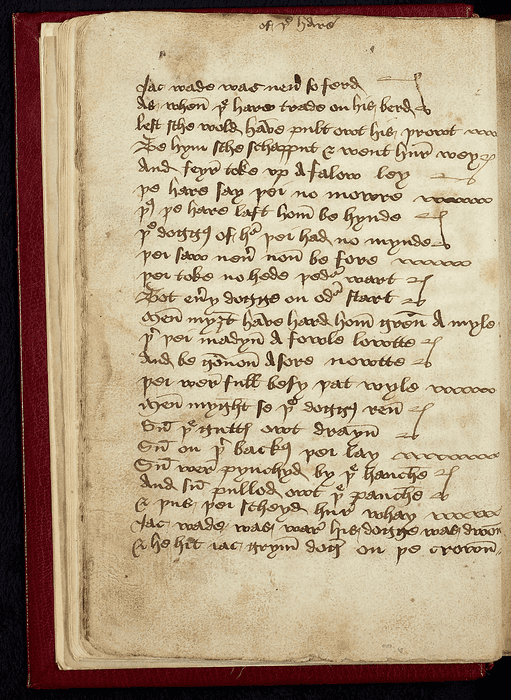As much as their bizarre medical ideas and feudal lifestyles may make us forget it, our medieval ancestors were really not much different from us. They used the same turns of phrase as we do; they chilled out in deck chairs and chowed down on an absurd amount of chicken – and according to a new discovery out of Scotland, they also enjoyed going out to watch a live comedy show or two.
“Most medieval poetry, song and storytelling has been lost”, said James Wade, Associate Professor at Cambridge University’s English Faculty and Girton College, and author of the study, in a statement.
But with the accidental rediscovery of a sign-off note in the 15th century “Heege Manuscript”, Wade realized he had found an unprecedented record of medieval comedy. And it’s not a perfected, respectful final draft of a play or parable, either: it’s an account of a particularly raucous live comedy show, complete with irony, slapstick, satire – and a killer rabbit joke worthy of its own Monty Python sketch.
“Manuscripts often preserve relics of high art. This is something else,” Wade said. “It’s mad and offensive, but just as valuable. Stand-up comedy has always involved taking risks and these texts are risky! They poke fun at everyone, high and low.”
Part of “The Hunting of the Hare” poem in the Heege Manuscript, featuring the killer rabbit. The first lines read: “Jack Wade was never so sad / As when the hare trod on his head / In case she would have ripped out his throat.”
Image credit: National Library of Scotland
While traveling minstrels were a mainstay of medieval life, wandering between fairs, taverns, and grand halls to entertain audiences with chivalric tales and ballads about great historic battles, we know precious little about any real-life performers. The few details we do have are prosaic at best: the first name of a minstrel; the instrument they played, and how much they earned for the night.
Wade’s analysis of the Heege manuscript doesn’t change that reality entirely: the minstrel delivering the show is still anonymous, for instance. But it does allow “an insight into someone … [that] is incredibly rare and exciting,” he said – since at least part of the text likely came from the minstrel’s own set notes, Wade thinks.
“These texts … serve up everything from the satirical, ironic, and nonsensical to the topical, interactive and meta-comedic,” he explained. “It’s a comedy feast.”
But that made it difficult to commit entirely to memory, he added. “He didn’t give himself the kind of repetition or story trajectory which would have made things simpler to remember.”
So how did the text go ignored for so long? According to Wade, it’s because we simply weren’t looking for it: previous study of the manuscript had mostly focused on how it was made, he explained, rather than appreciating the comedy stylings found within.
And yet the find is not only important for its insight into medieval stand-up – it also has some other, more literary claims to fame. It contains the first recorded use of the phrase “red herring” to mean a diversion, as well as an alliterative nonsense verse – very rare in Middle English – titled The Battle of Brakonwet, in which Robin Hood parties with musical bumblebees and foxes.
“Here we have a self-made entertainer with very little education creating really original, ironic material,” Wade enthused.
“These texts remind us that festive entertainment was flourishing at a time of growing social mobility.”
But despite his serendipitous find, Wade cautions against getting our hopes up for much more in the way of medieval comedy reruns. Nevertheless, resources like Heege’s notes provide an invaluable insight into a comedy tradition, which, while long lost, is in many ways strikingly similar to our modern tastes.
“You can find echoes of this minstrel’s humor in shows like Mock the Week, situational comedies and slapstick,” Wade pointed out. “The self-irony and making audiences the butt of the joke are still very characteristic of British stand-up comedy.”
“People back then partied a lot more than we do today, so minstrels had plenty of opportunities to perform,” he added. “They were really important figures in people’s lives right across the social hierarchy. These texts give us a snapshot of medieval life being lived well.”
The study is published in The Review of English Studies.
Source Link: Incredibly Rare Record Of Medieval Stand-Up Comedy Show Reveals Monty Python-Esque Joke
